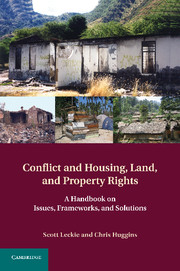Book contents
- Frontmatter
- Contents
- Opening Note and Acknowledgments
- Foreword by Dan Lewis
- 1 Introduction to the Issues – HLP Rights and Sustainable Peace
- 2 The International HLP Rights Normative Framework
- 3 Displacement, Conflict, and HLP Rights
- 4 HLP Restitution Rights
- 5 Restitution Mechanisms and Institutional Frameworks
- 6 United Nations and Other Peace Operations and HLP Rights
- 7 Protracted Displacement and Political Obstacles to the Protection of HLP Rights
- 8 Emerging Conceptual Issues
- 9 Improving International Responses to HLP Rights and Conflict
- Index
- References
1 - Introduction to the Issues – HLP Rights and Sustainable Peace
Published online by Cambridge University Press: 03 May 2011
- Frontmatter
- Contents
- Opening Note and Acknowledgments
- Foreword by Dan Lewis
- 1 Introduction to the Issues – HLP Rights and Sustainable Peace
- 2 The International HLP Rights Normative Framework
- 3 Displacement, Conflict, and HLP Rights
- 4 HLP Restitution Rights
- 5 Restitution Mechanisms and Institutional Frameworks
- 6 United Nations and Other Peace Operations and HLP Rights
- 7 Protracted Displacement and Political Obstacles to the Protection of HLP Rights
- 8 Emerging Conceptual Issues
- 9 Improving International Responses to HLP Rights and Conflict
- Index
- References
Summary
Housing, land, and property (HLP) rights crises are present in all conflicts and postconflict settings, and their management by those engaged in peace efforts can often be decisive in determining the extent to which peace is sustained and the degree to which measures of remedial and restorative justice are enshrined within postconflict political and legal frameworks. Conflicts are inherently complex, fluid, and multidimensional phenomena. The causes, forms, and impacts of conflict are perceived very differently by different actors (both “insiders” and “outsiders”) and change over time, so that they cannot easily be predicted or reduced to simple statements of “fact.” Nevertheless, the importance of HLP issues will strike anyone who has researched or observed violent conflicts in any part of the world.
In many countries, disputes over housing, land, and property, often with ethnic or other group-identity dimensions, are one of the root causes of violent conflict. There are many different types of HLP disputes, and disputes may be perceived, described, or categorized in different ways by different actors. Some disputes involve different claims to property among actors who agree on the tenure systems in place; in other words, they agree on the rules of property ownership and use, but some stakeholders think that other actors are breaking the rules. Of course, even when actors agree on a single tenure system, their interpretations of the tenure system may be different. State legislation may be outdated, unclear, inherently contradictory, or ambiguous.
- Type
- Chapter
- Information
- Conflict and Housing, Land and Property RightsA Handbook on Issues, Frameworks and Solutions, pp. 1 - 52Publisher: Cambridge University PressPrint publication year: 2011



